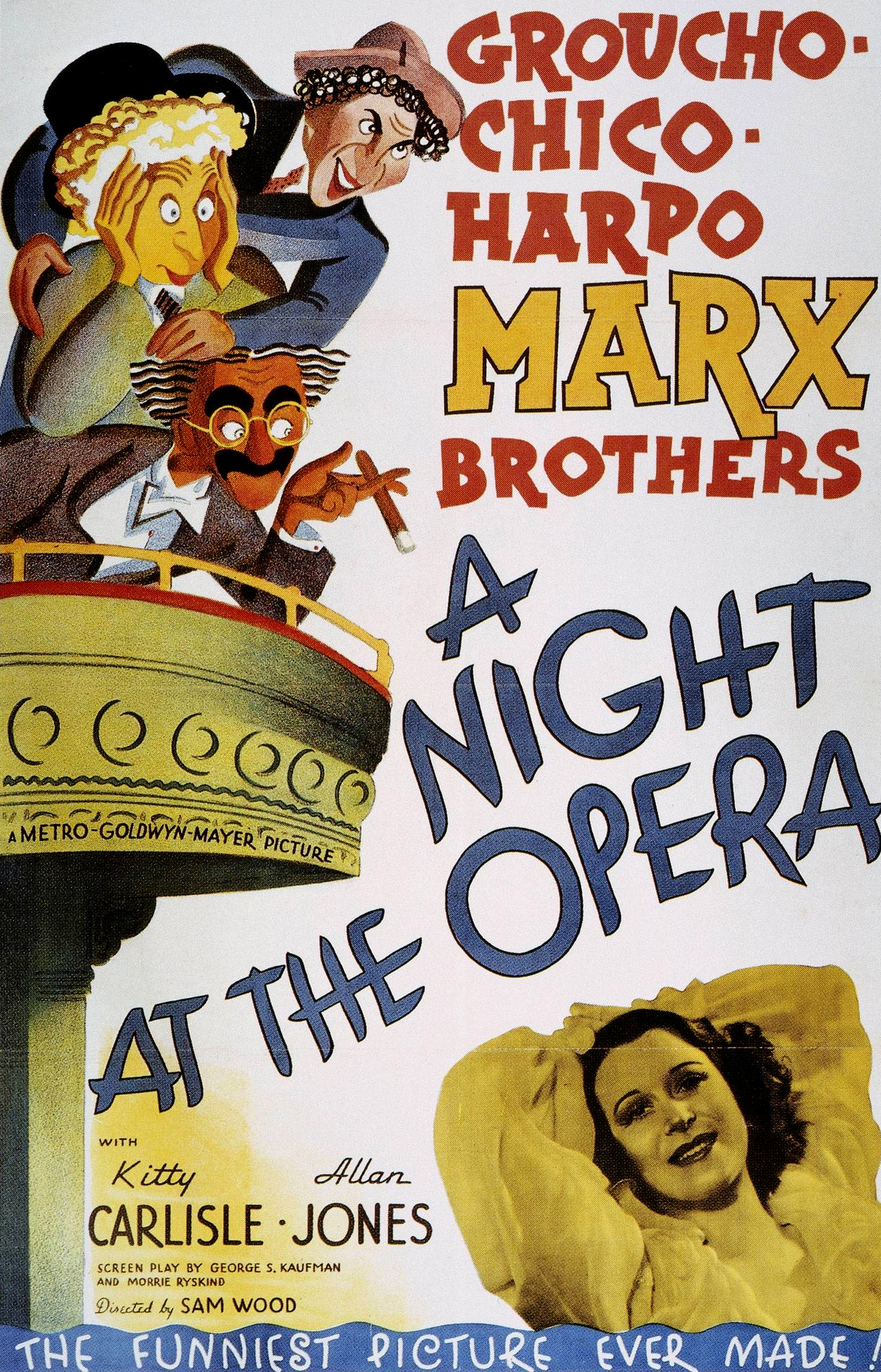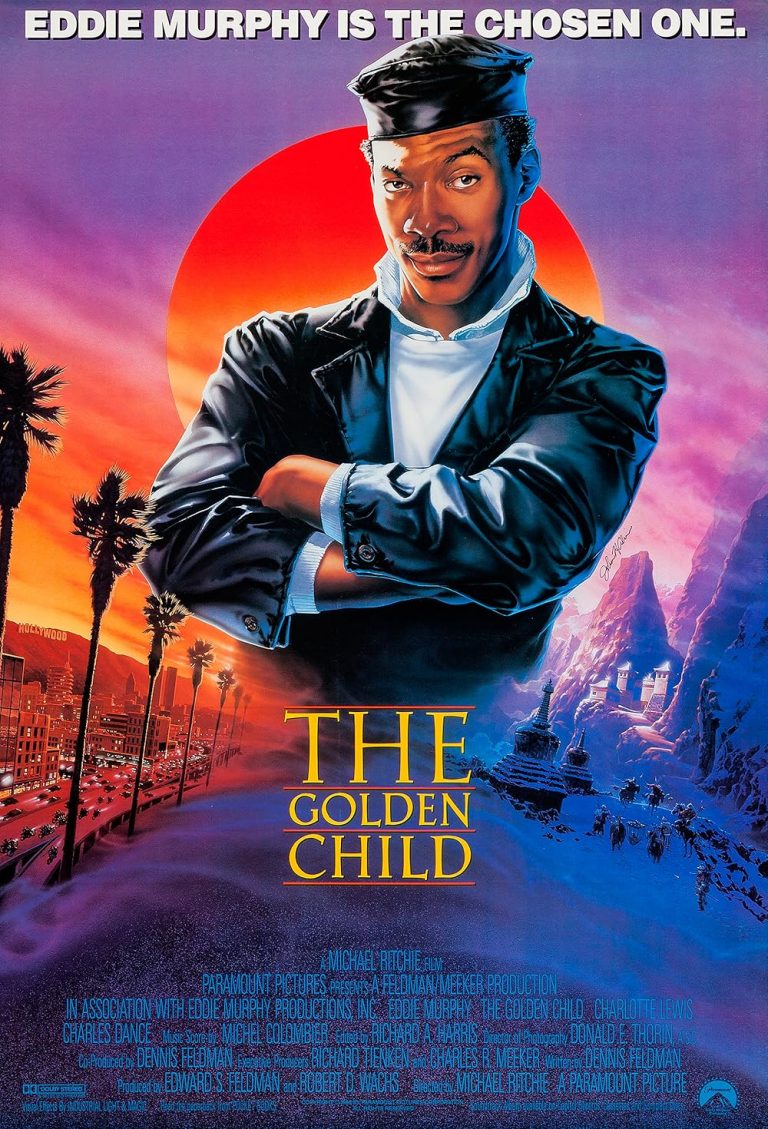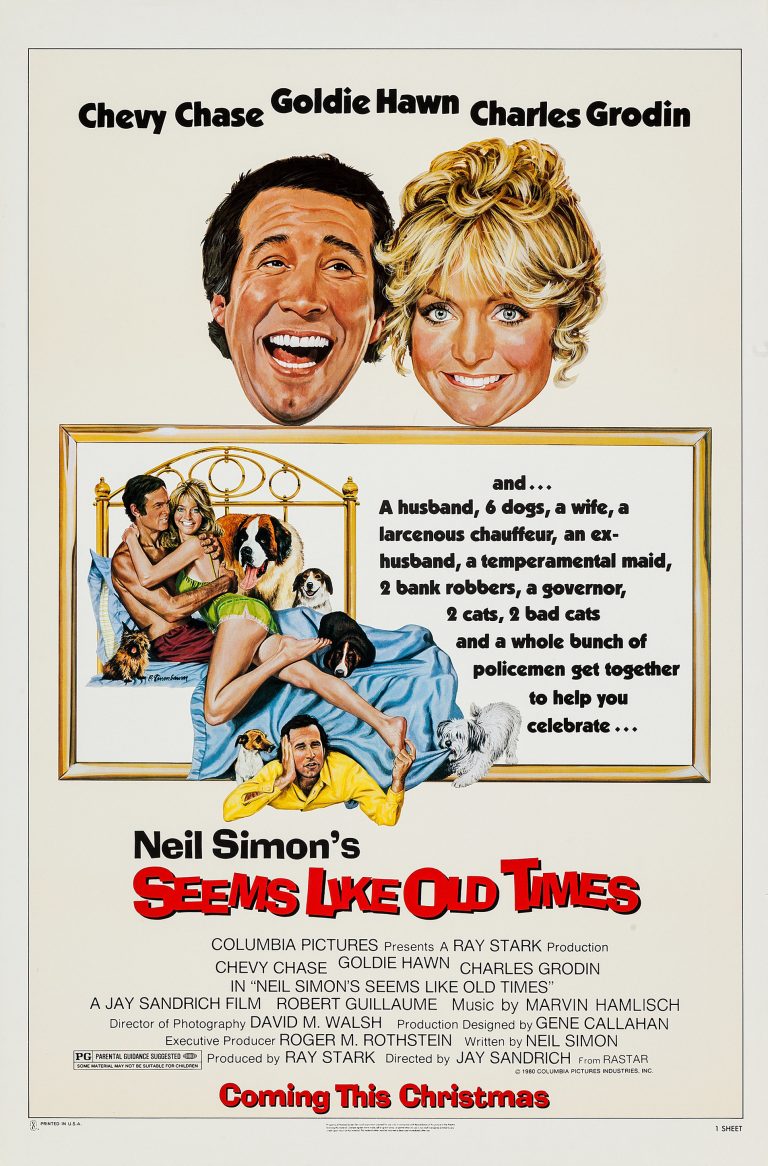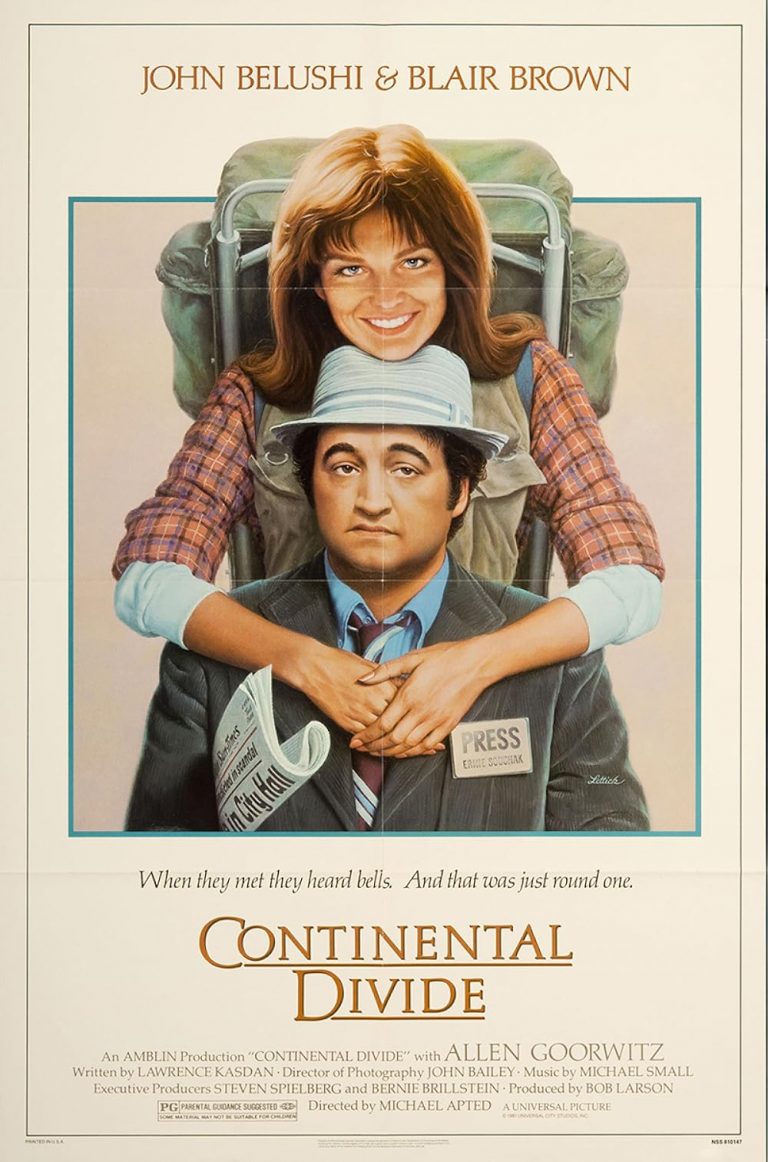Starring: The Marx Brothers (Groucho, Chico, and Harpo)
Grade: Classic
I can’t believe Zeppo wanted to miss out on all the fun being had here.
Summary
At a restaurant in Milan, Italy, wealthy widow Ms. Claypool (Margaret Dumont) waits alone for her business manager Otis B. Driftwood (Groucho). She’s been waiting for an hour, and he still hasn’t shown. She has one of the workers page for him, but it turns out he was sitting at the table behind her with another woman. She gets mad at him because she’s been waiting this whole time for dinner, but he already ate with the other woman. However, once Driftwood gets the bill, he gives it to the woman he’s sitting with and sits down with Claypool instead. Claypool wants to talk business because Driftwood was supposed to help her get into high society, so Driftwood talks about how Herman Gottlieb (Sig Ruman) is there at the restaurant. He’s the director of the New York Opera Company. Driftwood says he arranged for her to invest $200,000 in the company, putting her right there with the elite. Gottlieb comes over to thank Claypool and says that with her money, they will be able to sign the famed opera singer Rodolfo Lassparri (Walter Woolf King), the “greatest tenor since Caruso”. Gottlieb and Claypool head out together, with Gottlieb promising Claypool will have New York at her feet.
Backstage at the opera house, Lassparri finds his dresser Tomasso (Harpo) dressed in several different costumes, some of which are his, so he attacks and fires him. Rosa Castaldi (Kitty Carlisle) consoles Tomasso and helps him up. Just as Lassparri opens his door to presumably yell and attack Tomasso some more, he changes his tune once he sees Rosa. He invites Tomasso back into his dressing room but privately beats the hell out of him, as Rosa goes back to her room. Her assistant gives her flowers from Lassparri but she has no interest in them. Just then, Ricardo (Allan Jones) shows up to greet her. She’s much more attracted to Ricardo, and we can see it as her mood changes instantly. Even though Ricardo is a lowly chorister in the opera while she’s one of the stars, they are very close. Anyway, he asks her out and she accepts, despite Lassparri asking her first. Just showing up at the opera house is Fiorello (Chico). After greeting a worker and giving Tomasso a gift of a sausage, who gifts him the same thing, he meets up with Ricardo backstage during the performance. They’ve been friends for years, and Fiorello hurls a lot of words of encouragement to Ricardo about how he’s better than Lassparri and such. He suggests Ricardo get a manager, nominating himself for the position. Ricardo can’t pay him, but he’s cool with it because he doesn’t have a job anyway. As we see Driftwood ride around outside in a horse and buggy until the opera is over, we cut back to Fiorello and Ricardo who discuss Rosa and working together again after all these years.
As the opera comes to a close, Gottlieb tells Claypool he’s not so sure if Driftwood should be her business manager since he didn’t even bother to show up. She seems to agree. Once it officially ends, Driftwood walks in and tries to act like everything is cool. As Gottlieb gets Claypool to agree to pay Lassparri $1,000 a night, Driftwood tries to get in on the action and says he should be involved since he represents her, but Gottlieb represents the New York Opera Company and is signing him on their behalf. Backstage, Tomasso delivers a message to Lassparri written on a business card from Gottlieb, asking to have a meeting with him. Lassparri tries to take Rosa with him for his meeting with Gottlieb, but she turns him down because she’s going out with Ricardo, despite Lassparri mentioning how he may be able to choose his leading lady in New York if she does come. Pissed off and hearing Tomasso making noise for no reason, he starts attacking Tomasso, telling him he’s fired. Driftwood interrupts and stops things from going any further. As he starts to mess with Lassparri, Tomasso comes from behind and knocks Lassparri out with a mallet. Tomasso uses a smelling salt to wake him back up, but he knocks him out again with the mallet. Fiorello introduces himself to Driftwood and they talk, with Driftwood talking about how he’s trying to sign the “greatest tenor in the world” that works at the opera, though he has no idea what the guy looks like. Seeing this as his opportunity as Ricardo’s new manager, Fiorello says he’s the manager of the guy Driftwood is looking for. Driftwood says they need to set sail for New York tomorrow and offers him $10 a night. Fiorello takes it.
They argue over the details of the contract (the famous “Sanity Clause” scene) but ultimately, he agrees to sign with him.
*Every glance from Groucho in this sequence gets me chuckling*.
Gottlieb shows up to talk with Lassparri, so Fiorello points to him on the ground. Driftwood is confused, so Fiorello tells him he signed his guy Ricardo, not Lassparri. Just as Gottlieb wakes up Lassparri, Tomasso drops a stage weight on his head to knock him back out again. The next day, all the characters are about to set sail. As we see Driftwood and Claypool get on the ship, Ricardo wishes Rosa good luck. Gottlieb greets them, so Rosa tries to use this as an opportunity to talk up Ricardo’s skills. Gottlieb says he heard of his skills because of Driftwood, but it doesn’t matter. They are quickly interrupted by Lassparri’s arrival, with Gottlieb leaving them to greet him. Eventually, the mob of people with Lassparri get closer, and Rosa is swept up by the crowd and Lassparri on the way to the ship. Ricardo is left behind. The mob of fans ask Lassparri to sing before they depart, but he feigns laryngitis, so they all ask Rosa instead. She obliges and Ricardo joins in from the dock. During the back-and-forth, Fiorello and Tomasso drop in the ship to say goodbye to Rosa and leave. Inside the ship, Driftwood sees his gigantic suitcase being delivered, so he jumps on it like he’s being chauffeured. They crash into another worker delivering more big luggage, so he threatens the guy and offers him insurance he’s selling in exchange for the $1 he has on him. He puts the form in the guy’s coat, but it’s just the hotel bill he didn’t pay.
He jumps back on his suitcase but stops by Rosa’s room because he hears her crying. He delivers a hand-written love letter from Ricardo to make her feel better. Next, he stops by Claypool’s room. He wants to talk, but she’s not in the mood, so he keeps annoying her until she agrees to meet him in his room in ten minutes. Finally, Driftwood gets to his room, but it’s outrageously small. Apparently, Gottlieb picked it out for him personally. Frustrated, Driftwood goes into his room to unpack. He opens his suitcase but finds that Fiorello, Ricardo, and an asleep Tomasso were hidden as stowaways in his luggage because they’re all trying to get to New York. Driftwood agrees to not say anything but tells them to leave because Claypool is coming over soon. They promise to leave, but they want food first and refuse to leave without it. This forces Driftwood to put in a massive order for food but as they wait in the cramped room, several different ship workers all drop in to either fix something, offer something, or do whatever else to the room. Right after the food shows up and there’s like 20 people in this tiny room, Claypool shows up to open the door, and they all fall out.
Though they may be off to a rough start, it’s off to New York! However, the trouble this group will run into has just begun.
My Thoughts:
When the Marx Brothers left Paramount Pictures for MGM, their films changed. Though the chaotic style of the brothers remained, producer Irving Thalberg wanted to change things up a bit. Instead of having the group mess with anyone and everyone in their path, as they stumble through a loose plot to hysterical results, Thalberg was hoping to widen the appeal of their films. For starters, he wanted the characters they play to be more sympathetic and helpful. Accompanied with a more focused story to navigate through, the brothers would then only mess with the villainous characters to be more likable. Though us fans love their work with Paramount where they were allowed to roam free in the most anarchic ways possible, pissing off everyone and their mothers (their specialty), who knows if this would have worked as a long-term strategy. Though the gags would always be funny, a more cynical audience in later years could have potentially grown tired of the brothers’ antics and how they essentially stall the plot of the film in search of humor. As I have stated in previous reviews, I love this aspect of their older films, but again, this is something only the Marx Brothers could get away with. When you hit “legendary” status, you can get away with things others can’t. If anyone else would write these films in the same manner without the name value, the scripts for the brothers’ Paramount films would be panned because of how “unlikable” the main characters are. It’s literally the example of how not to write a character in a screenplay.
With A Night at the Opera, the brothers’ first film with MGM, Irving Thalberg saw the future and changed the focus of the brothers’ style in the world of cinema. In doing so, he succeeded, giving us arguably the most complete Marx Brothers production ever produced. Not only were Marx Brothers fanatics satisfied with Groucho, Chico, and Harpo messing with the lives of the villains they cross paths with, but the new grounded focus on a story is a welcomed one and not the hurtle we may have thought it was going to be for our beloved comedy team. For the record, I do prefer the Marx Brothers films when they were with Paramount because they were so unique and more their style, but even saying this, A Night at the Opera is their second-best film. Considering how many comedy classics they have put out, this is saying A LOT.
Groucho sets the tone as Otis B. Driftwood, the shyster looking to make as much money as possible in the opera without ever having to watch a performance. For the first time since Groucho Marx entered the world of film, his character actually has a goal. Rather than just going around and messing with people because it’s hilarious, he’s trying to sign the best tenor in the world to make money, especially doing so to get at Gottlieb who stole his meal ticket of Ms. Claypool from under his nose. Along the way, he befriends Fiorello, Tomasso, and Ricardo. Though he’s tricked into signing Ricardo by Fiorello, he deals with it. This isn’t only because Ricardo is a serious talent who can help Driftwood towards his goal, but Ricardo is also genuinely a good guy. Fiorello and Tomasso are already friends with Ricardo, and Fiorello takes on the role of being Ricardo’s manager, so Driftwood is forced into a working relationship. Even so, you can tell he likes the guys and enjoys their antics because they are similar to his. This is why he goes to bat for them so often when he doesn’t have to. Sure, Ricardo is his only shot at fixing his financial position, but this is the first time a Groucho character defends others from bullshit. It even leads to him losing his job because he continues to associate with them, despite the bad press they bring and him being told to drop them. For critics that may have wanted more substance out of the Marx Brothers movies, A Night at the Opera is one of the first instances in which we see these characters choose a side instead of just continuously fucking around, and it’s an interesting change of pace.
Before, Groucho would probably watch Harpo get his ass kicked by Rodolfo in that earlier scene and make as few funny quips as it happens much like how all three brothers watch Zeppo fight the main villain in the climax of Monkey Business. In A Night at the Opera however, Groucho’s Driftwood steps in and directs his comments towards the secondary villain in Rodolfo to distract him and get him to stop. Following this, Driftwood and Harpo’s Tomasso befriend each other for the first time, instead of just running into each other in random circumstances like how they have done in previous films. Finally, there is purpose. This may be a strange thing to highlight in a review because characters should always have purpose, but again, we’re talking about the Marx Brothers here. This was a rarity up until this movie. To further garner sympathy at the wish of Irvin Thalberg, Tomasso is a worker at the opera house and is treated like shit by Rodolfo but loved by everyone else because he’s pretty harmless, and Chico’s Fiorello is a poor childhood friend of Ricardo who is jobless and aimless but wants to do right by his friend, constantly showering him with positivity about his talent. Everything works, and their new roles in the film are established within their introductory scenes. They’re more likable than ever. This time, it’s not just because they are funny like in previous movies, it’s because they are inherently good and they’re funny.
This became the new role for Chico in these later Marx endeavors. From here on out, his go-to role in the movie was to be the friend or helper to the romantic lead, and he is aligned with Harpo’s character somehow, either playing Harpo’s brother or friend. As a result, this trio would become close in their side adventure, while Groucho’s character would have his own separate story that drives the other side of the film. Eventually, both stories would find a way to intersect. Basically, this is the blueprint for everything they did post-Paramount, but despite it being predictable in story beats, it still brought them a great deal of success and arguably extended their film careers. No matter what you think about the later stuff compared to their earlier works, I’m just thankful as a fan that we got more Marx content in general.
Between this film and A Day at the Races, this is probably the best Allan Jones has been. He’s a lot more likable here and his role wasn’t a total bore for being a non-Marx, so that’s a plus. Plus, Cosi Cosa is a banger.
The only thing that bothers me with the MGM films is that Zeppo wasn’t with his brothers. With a new focus on plot and characters, the next few films, starting with A Night at the Opera, could have given Zeppo a role worth his time, assuming he would be in place of Allan Jones. It’s honestly a shame because he’s the only one out of the four who never got his time to shine because of how they styled their films in Paramount. With MGM, he actually would have been a factor. This is a real missed opportunity that actually bothers me.
Going along with the widened appeal to include a more family friendly audience, the instrument playing sequences are welcomed this time around. As I’ve said before, these scenes are usually hit-or-miss in a Marx Brothers film because they sometimes have a tendency to stall the plot, but it was enjoyable here. Watching Chico and Harpo entertain the children on the poor side of the ship as they play the piano and harp, while including some amusing bits to make everyone laugh, is a harmless scene that is sure to bring a smile to your face. It truly feels as if they are having just as much fun filming this scene and entertaining everyone on set as we are watching it.
The humor is consistently funny throughout while all three brothers put together enjoyable, sympathetic performances without sacrificing their personas as chaos-bringers, which is impressive because they could have easily lost this battle if they were placed in the wrong hands. Because of the genius of this film, we are lucky enough to witness the laugh-out-loud room-switching sequence and the impersonating of the three aviators. The stateroom scene alone might be one their funniest gags ever. Though it may seem like the characters hold back a tad to keep the plot moving, when they could push everyone’s buttons further like how we are used to them doing, they are mostly saved and placed strategically throughout to give us a more well-rounded feature. By the time we are bursting at the seams wanting more, we realize the best was saved for last, giving us a third act that is about as “Marxian” as it comes. Driftwood, Fiorello, Tomasso, and Ricardo are forced to put together a plan to save Ricardo and Rosa’s jobs while destroying the opera at the same time. In doing so, they are fully unleashed to hysterical results. It’s the payoff we were waiting for, with the brothers going all-in on their antics to throw the opera upside down, capping off an iconic film in legendary fashion.
A Night at the Opera is one of the greatest comedies of all time. To this day, the Marx Brothers prove to be timeless with clever and effortlessly funny quotes, gags, and comedic sequences that continue to get laughs and influence performers and writers even in the modern era. Though I still consider Duck Soup to be their magnum opus, A Night at the Opera is right up there with one of the funniest productions ever produced. Honestly, if you argued this film to be the better one, I’d still keep my mouth shut because it’s that close of a race.
However, one thing that we can agree on is that for a long time, these brothers couldn’t miss, and A Night at the Opera only added to their untouchable legacy in comedy.





+ There are no comments
Add yours